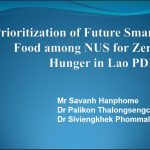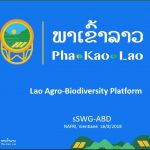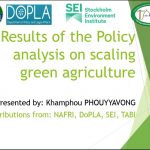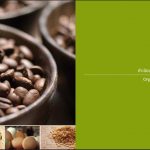
Title of document: Potential of young entrepreneurs and underutilized products Authors: Nongnut Foppes Journal’s name if any: Ministry/Government Agency/Organisation: TABI and Xao Ban Year of publication: 2018 Geographic focus: Lao PDR Main issues / topics addressed (for example: Why is the Xao Ban Group interested in Underutilized Products?; Public-Private Partnership on Underutilized Products in Xieng Khouang; Xao Ban trust building approach) School of agroecology (if any): Web address to original document (if any): Summary: Presentation for Sub Sector Working Group Meeting on Agrobiodiversity, 16 August 2018, Vientiane, Lao PDR Read More
5 downloads
Author: ALiSEA teams

Authors: Mr Savanh Hanphome; Dr Palikon Thalongsengchan; Dr Siviengkhek Phommalat Journal’s name if any: Ministry/Government Agency/Organisation: Year of publication: 2018 Geographic focus: Lao PDR Main issues / topics addressed (for example: Introduction; Examples on the Evolution of Specific NUS that became Important Commercial Crops: Quinoa; Neglected and underutilized crops species (NUS) in Laos) School of agroecology (if any): Web address to original document (if any): Summary: Presentation for Sub Sector Working Group Meeting on Agrobiodiversity, 16 August 2018, Vientiane, Lao PDR Read More
14 downloads
Author: ALiSEA teams

Title of document: Lao Agro-Biodiversity Platform Authors: Pha Khao Lao Journal’s name if any: Ministry/Government Agency/Organisation: Pha Khao Lao Year of publication: 2018 Geographic focus: Lao PDR Main issues / topics addressed (for example: Introduction; Challenges and opportunities; Next steps; Demonstration and Launching…) School of agroecology (if any): Web address to original document (if any): Summary: Presentation for Sub Sector Working Group Meeting on Agrobiodiversity, 16 August 2018, Vientiane, Lao PDR Read More
8 downloads
Author: ALiSEA teams

Title of document: Mountain Futures Authors: Jianchu Xu, PhD Journal’s name if any: Ministry/Government Agency/Organisation: Mountain Futures, WAC, CAS, CARS Year of publication: 2018 Geographic focus: China Main issues / topics addressed (for example: Different Mountains, Shared Dream; Our Footprint; Our Core Values; Our Mission…) School of agroecology (if any): Web address to original document (if any): Summary: Presentation for Sub Sector Working Group Meeting on Agrobiodiversity, 16 August 2018, Vientiane, Lao PDR Read More
4 downloads
Author: ALiSEA teams

Title of document: Results of the Policy analysis on scaling green agriculture Authors: Khamphou PHOUYYAVONG Journal’s name if any: Ministry/Government Agency/Organisation: NAFRI, DoPLA, SEI, TABI Year of publication: 2018 Geographic focus: Lao PDR Main issues / topics addressed (for example: Background to Study; Defining terms; Key messages – Policy of the study; Principles of Green and Sustainable Agriculture (G&SA)…) School of agroecology (if any): Web address to original document (if any): Summary: Presentation for Sub Sector Working Group Meeting on Agrobiodiversity, 16 August 2018, Vientiane, Lao PDR Read More
6 downloads
Author: ALiSEA teams
Title of document: Organic Directory in Vietnam Authors: Journal’s name if any: Ministry/Government Agency/Organisation: Year of publication: Geographic focus: Vietnam Main issues / topics addressed (for example:…) School of agroecology (if any): Web address to original document (if any): Summary: Read More
8 downloads
Author: ALiSEA teams
Title of document: Organic Directory in Myanmar Authors: Journal’s name if any: Ministry/Government Agency/Organisation: Year of publication: Geographic focus: Myanmar Main issues / topics addressed (for example:…) School of agroecology (if any): Web address to original document (if any): Summary: Read More
8 downloads
Author: ALiSEA teams
Title of document: Organic Directory in Cambodia Authors: COrAA Journal’s name if any: Ministry/Government Agency/Organisation: COrAA Year of publication: 2014 Geographic focus: Cambodia Main issues / topics addressed (for example:…) School of agroecology (if any): Web address to original document (if any): Summary: Directory of Organic Farms certified by Cambodian Organic Agriculture Association (COrAA) Read More
9 downloads
Author: ALiSEA teams
Title of document: List of Organic Markets in Lao PDR Authors: Journal’s name if any: Ministry/Government Agency/Organisation: Year of publication: Geographic focus: Lao PDR Main issues / topics addressed (for example:…) School of agroecology (if any): Web address to original document (if any): Summary: Read More
2 downloads
Author: ALiSEA teams

Title of document: Organic Directory in Thailand Authors: MoC Journal’s name if any: Ministry/Government Agency/Organisation: MoC Year of publication: Geographic focus: Thailand Main issues / topics addressed (for example: Producer: Farm, Manufacturer; Service: Hotel, Shop, Restaurant; Related Agency…) School of agroecology (if any): Web address to original document (if any): Summary: Organic Directory in Thailand Read More
14 downloads
Author: ALiSEA teams

 Asia & Mekong Region
Asia & Mekong Region  Cambodia
Cambodia  Laos
Laos  Myanmar
Myanmar  Other
Other  Vietnam
Vietnam